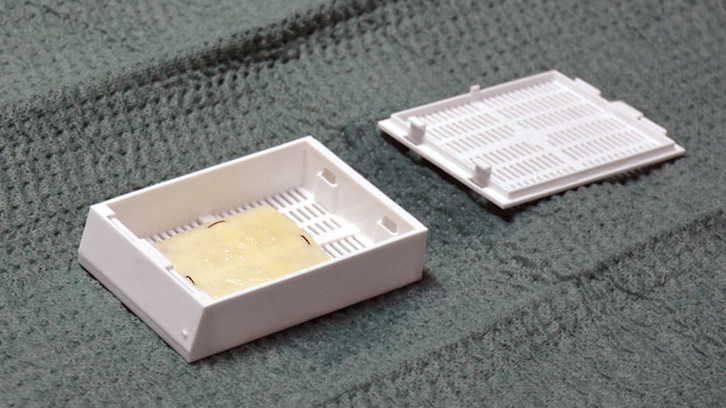PeriCord, a new bioimplant for heart repair after infarction

A study at Can Ruti, led by Prof Antoni Bayés Genís and conducted by the researcher Cristina Prat-Vidal, describes the development and first-in-human surgical implantation of a new bioimplant named PeriCord. The bioimplant, envisioned to treat patients after suffering a heart attack, allows local delivery of umbilical cord-derived mesenchymal stromal cells over the infarct scar. The researchers detail in the study both scale up and manufacturing processes followed to comply with the safety requirements and quality standards concerning investigational medicinal products in clinical trials. These data have been published in the prestigious EBioMedicine journal, a member of The Lancet family.
When a myocardial infarction occurs, muscle cells served by the blocked artery begin to die leading to a scar formation that weakens the heart, reducing its ability to pump blood efficiently. This loss of function can impact on patient’s activities of daily living, as well as the quality and life expectancy. Hence, the finding of our research group, led by Dr. Antoni Bayés Genís at the Germans Trias i Pujol Research Institute (IGTP), is very relevant. Recovering heart’s ability to pump effectively is one of the ICREC group’s main goal, a research area we have been pursuing for more than ten years. Finally, we successfully transferred to the clinic a pioneering new therapy for the treatment of myocardial infarction.
Bioimplant scalability and manufacturing process for clinical use have been possible thanks to the collaboration of Blood and Tissue Bank (BST) and the Bioengineering Institute of Catalonia (IBEC). We named it PeriCord in honour of its two major components: the pericardium and the cord. PeriCord is a 16-cm2 human decellularised pericardium (the membrane enclosing the heart) colonised with umbilical cord-derived mesenchymal stromal cells. These cells have a high degree of plasticity and important immunomodulatory and anti-inflammatory properties. Previously, we had shown in preclinical studies that this bioimplant had reparative capacity in pigs, which reduced the infarct scar and improved cardiac function. In mice, formed small blood vessels in the myocardial infarct area.
PeriCord was approved by the Spanish Agency of Medicines and Medical Devices (AEMPS) and is being implanted in patients in the operating rooms of the Germans Trias i Pujol University Hospital. The procedure involves the bioimplant fixation directly onto the infarct area of the heart using surgical glue. This local delivery allows umbilical cord mesenchymal stromal cells to activate reparative mechanisms directly in the infarct scar.
First-in-human surgical implantation was performed once year ago. The operated patient, who is followed up by the Hospital’s Cardiology Service, is evolving very favourably. However, it is necessary to follow the safety assessment process of this new therapy, located halfway between conventional surgery and organ transplantation, before being able to treat patients on a large scale.
Whether reparative capacity of PeriCord is confirmed in humans, we will be able to abate common associated heart attack complications, such as heart failure which affects 10% of patients over 70 years.
Cristina Prat-Vidal1 i Antoni Bayés Genís2,3
1Institut de Recerca Germans Trias i Pujol (IGTP).
2Hospital Universitari Germans Trias i Pujol (HUGTiP).
3Universitat Autònoma de Barcelona (UAB).
References
Prat-Vidal C, Rodríguez-Gómez L, Aylagas M, Nieto-Nicolau N, Gastelurrutia P, Agustí E, Gálvez-Montón C, Jorba I, Teis A, Monguió-Tortajada M, Roura S, Vives J, Torrents-Zapata S, Coca MI, Reales L, Cámara-Rosell ML, Cediel G, Coll R, Farré R, Navajas D, Vilarrodona A, García-López J, Muñoz-Guijosa C, Querol S, Bayes-Genis A. First-in-human PeriCord cardiac bioimplant: Scalability and GMP manufacturing of an allogeneic engineered tissue graft. EBioMedicine. 2020 Apr 15;54:102729. doi: 10.1016/j.ebiom.2020.102729.

